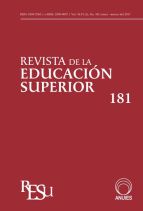
Revista de la Educación Superior.
Marek Kwiek. La desprivatización en la educación superior: un enfoque conceptual. Revista de la Educación Superior. 2017. 1-26. Here.
Abstract: This paper seeks to conceptualize the processes of deprivatization in higher education. Trends of deprivatization (and contraction in enrolments) are highly interesting because they go against global trends of privatization (and educational expansion). Deprivatization means a decreasing role for the private component in the changing public-private dynamics. The paper studies its two dimensions (funding and provision) and distinguishes between seven potential empirical organizational/ geographical levels of analysis, stressing the continuing usefulness of a clear-cut distinction between the public and the private in some empirical contexts. The paper draws from data from Central Europe (Poland, Romania, Bulgaria and Estonia). The traditional dichotomous pairing of the public and the private is shown to still be useful in specific empirical contexts, despite it becoming blurred globally.
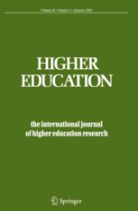
Higher Education.
Marek Kwiek. The European research elite: A cross-national study of highly productive academics in 11 countries. Higher Education 71 (3). 2016. 379-397. Here.
Abstract: In this paper, we focus on a rare scholarly theme of highly productive academics, statistically confirming their pivotal role in knowledge production across 11 systems studied. The upper 10 % of highly productive academics in 11 European countries studied (N = 17,211) provide on average almost half of all academic knowledge production. In contrast to dominating bibliometric studies of research productivity, we focus on academic attitudes, behaviors, and perceptions as predictors of becoming research top performers across European systems. Our paper provides a (large-scale and cross-country) corroboration of the systematic inequality in knowledge production, for the first time argued for by Lotka (J Wash Acad Sci 16:317–323, 1929) and de Solla Price (Little science, big science. Columbia University Press, New York, 1963). We corroborate the deep academic inequality in science and explore this segment of the academic profession. The European research elite is a highly homogeneous group of academics whose high research performance is driven by structurally similar factors, mostly individual rather than institutional. Highly productive academics are similar from a cross-national perspective, and they substantially differ intra-nationally from their lower-performing colleagues.
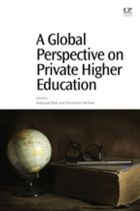
A Global Perspective of Private Higher Education
Marek Kwiek. From Growth to Decline? Demand-Absorbing Private Higher Education when Demand is Over. In: A Global Perspective of Private Higher Education edited by Mahsood Shah and Sid Nair, New York: Elsevier, 2016. 53-80. Here.
Abstract: The growth of the private sector in higher education in Europe – in terms of the number of institutions and the share of enrolments in national systems – has been an educational phenomenon of post-communist transition countries. As Daniel C. Levy (2010: 10) points out, though: “one of the key trends in international higher education, the rapid expansion of the private sector now holds one-third of all global enrollments. However, the growth is not unbroken or inexorable and sometimes stalls and even reverses”. Poland is an example of the reversal in question. While the expansion era (1990-2005) was characterized by external privatization (that is, private sector growth, combined with internal privatization, or the increasing role of fees in the operating budgets of public universities), the current contraction era (2005-2025, and possibly beyond) is characterized by what we term “de-privatization”. De-privatization also has external and internal dimensions: the gradual decline in private sector enrolments is combined with a decreasing role of fees in public universities. The private sector in Poland cannot be explored outside of the context of the public sector: its future is closely linked to the changing public–private dynamics in the whole system. It is useful to explore its future in the context of two major ongoing processes: large-scale reforms of public higher education, and broad, long-term demographic changes. The Polish case study is important for several reasons: the public–private dynamics is rapidly changing in a system which has the highest enrolments in the private sector in the European Union today. In the global context of expanding higher education systems there are several systems in Central and Eastern Europe, and Poland is the biggest of those which are actually contracting. Their contraction is fundamental and rooted in declining demographics. In the global (rather than European) context of increasing reliance on cost-sharing mechanisms and on the private sector growth paradigm in university funding, the Polish system seems to be moving in the opposite direction: global trends towards privatization can be juxtaposed with the Polish counter-trend towards de-privatization.

Multi-Level Governance in Universities. Strategy, Structure, Control.
Marek Kwiek. Academic Entrepreneurialism and Changing Governance in Universities. Evidence from Empirical Studies. In: Multi-Level Governance in Universities. Strategy, Structure, Control, : Jetta Frost, Fabian Hattke, and Markus Reihlen (eds.). Dordrecht: Springer, 2016. 49-74. Here.
Abstract: Entrepreneurial universities are increasingly important points of reference for international and European-level policy discussions on reforming higher education systems, and especially on a shift in its financing towards more self-reliance and its secure sustainable development in competitive environments. The chapter analyzes academic entrepreneurialism as emerging from recent European comparative (theoretical and empirical) studies. It outlines the theoretical (and ideological) “modernization agenda” of European universities promoted by the European Commission. Case studies of selected European institutions show that the modernization processes in question (and their emphasis on academic entrepreneurialism widely understood) have already been in progress in numerous institutions in different systems across Europe. The case studies also stress the pivotal role of changing governance at most entrepreneurially-oriented European universities.

Ideologies in Educational Administration and Leadership.
Marek Kwiek. Constructing Universities as Organizations. University Reforms in Poland in the Light of Institutional Theory. In: Eugenie Samier (ed.), Ideologies in Educational Administration and Leadership. New York: Routledge, 2016. 193-216. Here.
Abstract: This chapter shows that apart from changes at the systemic and institutional levels, successful reform implementation struggles with a gradual change in academic beliefs, attitudes and behaviours. Currently, visions of the university proposed by the Polish academic community and visions of it proposed by Polish reformers and policymakers (within ongoing reforms) are worlds apart. I shall study recent reforms in the context of specific academic self–protective narratives being produced in the last two decades (at the collective level of the academic profession) and in the context of the Ivory Tower university ideals predominant at the individual level (as studied comparatively through a large–scale European survey of the academic profession). Institutions change both swiftly, radically – and slowly, gradually. Research literature on institutional change until recently was focused almost exclusively on the role of radical changes caused by external shocks, leading to radical institutional reconfigurations. And research literature about the gradual, incremental institutional change have been emergent for about a decade and a half now (Mahoney and Thelen 2010; Streeck and Thelen 2005, 2009; Thelen 2003). Polish higher education provides interesting empirical grounds to test institutional theories. Both types of transformations (radical and gradual) may lead to equally permanent changes in the functioning of institutions, equally deep transformations of their fundamental rules, norms and operating procedures. The premises of theories of institutional change can be applied systematically to a system of higher education which shows an unprecedented rate of change and which is exposed to broad, fundamental reform programmes.
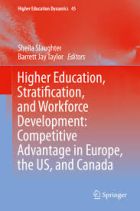
Higher Education, Stratification, and Workforce Development. Competitive advantage in Europe, the US and Canada.
Marek Kwiek. From Privatization (of the Expansion Era) to De-privatization (of the Contraction Era). A National Counter-Trend in a Global Context. In: Sheila Slaughter and Barrett Jay Taylor, editors. Higher Education, Stratification, and Workforce Development. Competitive advantage in Europe, the US and Canada. Dordrecht: Springer, 2016. 311-329. Here.
Abstract: This chapter shows that apart from changes at the systemic and institutional levels, successful reform implementation struggles with a gradual change in academic beliefs, attitudes and behaviours. Currently, visions of the university proposed by the Polish academic community and visions of it proposed by Polish reformers and policymakers (within ongoing reforms) are worlds apart. I shall study recent reforms in the context of specific academic self–protective narratives being produced in the last two decades (at the collective level of the academic profession) and in the context of the Ivory Tower university ideals predominant at the individual level (as studied comparatively through a large–scale European survey of the academic profession). Institutions change both swiftly, radically – and slowly, gradually. Research literature on institutional change until recently was focused almost exclusively on the role of radical changes caused by external shocks, leading to radical institutional reconfigurations. And research literature about the gradual, incremental institutional change have been emergent for about a decade and a half now (Mahoney and Thelen 2010; Streeck and Thelen 2005, 2009; Thelen 2003). Polish higher education provides interesting empirical grounds to test institutional theories. Both types of transformations (radical and gradual) may lead to equally permanent changes in the functioning of institutions, equally deep transformations of their fundamental rules, norms and operating procedures. The premises of theories of institutional change can be applied systematically to a system of higher education which shows an unprecedented rate of change and which is exposed to broad, fundamental reform programmes.

International Perspectives on Financing Higher Education.
Marek Kwiek. Competing for Public Resources: Higher Education and Academic Research in Europe. A Cross-Sectoral Perspective. In: Wojciech Bienkowski, Josef C. Brada, Massaki Kubomiwa, eds., International Perspectives on Financing Higher Education. New York: Palgrave, 2016. 6-24. Here.
Abstract: The chapter focuses on the increasing cross-sectoral competition for public resources between various types of public sector institutions in Europe and its implications for future public funding for both higher education and academic research. It views the major models of the institution of the modern (Continental) university and the major types of the modern institution of the state, and of the welfare state in particular, as traditionally closely linked (following Kogan et al., 2000; Kogan and Hanney, 2000; Becher and Kogan, 1992). Historically, in the post-war period in Europe, the unprecedented growth of welfare states and state-funded public services was paralleled by the unprecedented growth of public universities. The massification and universalization of higher education in Europe coincided with the growth of the welfare state in general. Currently, both processes in higher education are in full swing across Europe while welfare states are under the most far-reaching restructuring in their postwar history. The major implication is the fierce competition for public resources, studied in this chapter from a cross-sectoral perspective, in which the future levels of public funding for higher education in tax-based European systems are highly dependent on social attitudes towards what higher education brings to society and the economy, relative to what other claimants to the public purse can bring to them.

The Global Academic Rankings Game. Changing Institutional Policy, Practice, and Academic Life.
Marek Kwiek. Global University Rankings in the Polish Context: the University of Warsaw, a Case Study. Maria Yudkevich, Philip G. Altbach and Laura E. Rumbley, eds., The Global Academic Rankings Game. Changing Institutional Policy, Practice, and Academic Life, New York: Routledge. 2016. 146-170. Here.
Abstract: University rankings are a topic of controversy and contention in many countries. Poland is no exception. This chapter analyzes aspects of rankings in the Polish context. Poland is a particularly interesting case, since it is a middle-sized country with a middle-tier higher education system. Among the questions discussed here are: what is the impact of global university rankings on the Polish national flagship university, the University of Warsaw? Are the changes in funding and governance occurring in Polish higher education, and in our case study institution, directly or indirectly linked to rankings? Are rankings driving the push for planned changes both in the system and in the case study institution, or do these developments merely happen to be concurrent? How do academics and administrators view global rankings? What are their perceptions of global rankings with reference to the institution and to their own academic careers? How, if at all, do global rankings relate to national rankings? Is the institutional culture of the case study university changing more due to ongoing reforms, global rankings, or national rankings? These questions are discussed in a context of ongoing higher education reforms, rooted in the OECD discourse of the increasing role of competition in research and of competitive research funding in higher education funding.
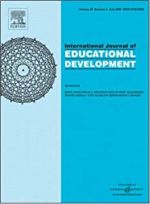
International Journal of Educational Development.
Marek Kwiek. The unfading power of collegiality? University governance in Poland in a European comparative and quantitative perspective. International Journal of Educational Development 43, 77-89. Here.
Abstract: This paper studies the applicability of theoretical models of university governance from the international research literature to the Polish system. In particular, it is to test the applicability of a collegial model in the Polish case. The research question was ‘to what extent is a collegial model reflected in actual governance patterns found in the Polish university sector’. This is based on large-scale internationally comparable quantitative material. The empirical evidence for it comes from 3700 returned surveys in Poland (and more than 17,000 in eleven European countries) produced for two international research projects focused on the academic profession (CAP: “Changing Academic Profession” and EUROAC: “The Academic Profession in Europe”). This paper concludes that Polish universities are operating according to the traditional collegial model of the university as a “community of scholars” to an extent that is unparalleled in Western Europe. A detailed study of selected variables and specifically constructed indexes indicates that the defining feature of Polish academia today is the power of academic collegial bodies. The influence of collegial bodies on academic decision-making in Poland is the highest in Europe; and, in contrast, the power of the government and external stakeholders is the lowest. However, academics, sharing the “republic of scholars” institutional vision of the university, and still highly influential in university decision-making, are currently confronted with higher education reforms grounded in an instrumental vision of the university (in which it is a tool for national political agendas). Consequently, powerful value-driven clashes between the academic community and the community of policymakers and reformers are to be expected to intensify. The major theoretical concepts used in this paper come from Johan P. Olsen’s, Ian McNay’s and Robert Birnbaum’s studies of university governance, and its findings are presented from a European comparative and quantitative perspective.

Journal of Studies in International Education.
Marek Kwiek. The Internationalization of Research in Europe. A Quantitative Study of 11 National Systems from a Micro-Level Perspective. Journal of Studies in International Education, 19(2), 2015. 341-359. Here.
Abstract: This article focuses on the impact of international research collaboration on individual research productivity in 11 European countries. Research productivity and international publication co-authorship of ” internationalists ” and ” locals ” (or academics collaborating and not collaborating internationally) are compared. The article uses a micro-level (individual) approach and relies on the primary data collected in a comparable format through a survey from 17,211 European academics. In all countries and all clusters of academic fields studied, international collaboration in research is strongly correlated with substantially higher research productions. Internationalization increasingly plays a stratifying role, though: More international collaboration tends to mean higher publishing rates and those who do not collaborate internationally may be losing more than ever before in terms of resources and prestige in the process of ” accumulative disadvantage. ” The competition is becoming a permanent feature of the European research landscape, and local prestige combined with local publications may no longer suffice in the race for resources and academic recognition. Cross-disciplinary and cross-national differences apply but our study shows a powerful role of internationalization of research for both individual research productivity and the competitiveness of national research outputs. Keywords cooperation and competition, globalization and international higher education, international cooperation in higher education, internationalization of higher education, internationalization of teaching, learning and research.
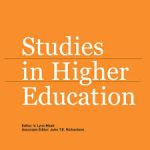
Studies in Higher Education.
Marek Kwiek. Academic generations and academic work: Patterns of attitudes, behaviors and research productivity of Polish academics after 1989. Studies in Higher Education, 40(8), 1354-1376. Here.
Abstract: This paper focuses on a generational change taking place in the Polish academic profession: a change in behaviors and attitudes between two groups of academics. One was socialized to academia under the communist regime (1945– 1989) and the other entered the profession in the post-1989 transition period. Academics of all age groups are beginning to learn how tough the competition for research funding is, but young academics (’academics under 40′), being the target of recent policy initiatives, need to learn faster. Current reforms present a clear preferred image for a new generation of Polish academics: highly motivated, embedded in international research networks, publishing mostly internationally, and heavily involved in the competition for academic recognition and research funding. In the long run, without such a radical approach, any international competition between young Polish academics (with a low research orientation and high teaching hours) and their young Western European colleagues (with a high research orientation and low teaching hours) seems inconceivable, as our data on the average academic productivity clearly demonstrate. The quantitative background of this paper comes from 3704 returned questionnaires and the qualitative background from 60 semi-structured in-depth interviews. The paper takes a European comparative approach and contrasts Poland with 10 Western European countries (using 17,211 returned questionnaires).

The Transformation of University Institutional and Organizational Boundaries.
Marek Kwiek. Inequality in Academic Knowledge Production. The Role of Research Top Performers Across Europe. In: Emanuela Reale and Emilia Primeri, eds., The Transformation of University Institutional and Organizational Boundaries. Rotterdam: Sense, 2015. 203-230. Here.
Abstract: This paper focuses on the inequality in academic knowledge production and finds the productivity distribution patterns across European systems to be strikingly similar, despite starkly different national academic traditions. The upper echelons of highly productive academics (the upper 10 percent of academics who are ranked highest in terms of their publishing performance in 11 European countries) provide, on average, almost half of all academic knowledge production. The primary data analyzed comes from the large-scale global CAP and European EUROAC research projects on the academic profession (“Changing Academic Profession” and “Academic Profession in Europe”), with 13,908 usable cases of research-involved academics. In particular, the data studied in this paper refer to a subpopulation of highly productive academics (N=1,583), contrasted with a subpopulation of 90 percent of the remaining academics (N=12,325). If a research question can be “the theoretical or empirical puzzle that motivates a given study” (Brady and Collier 2010: 347), then our study was motivated by the puzzle of the impact of highly productive academics on overall European publishing output. In short, the inequality in academic knowledge production in Europe is as follows: about 10 percent of academics – termed research top performers here – produce on average almost half (45.9 percent) of all articles, and 20 percent produce two-thirds of them (65.4 percent). The remaining 80 percent of academics produce on average only about one third of all articles (34.6 percent). If the research-active segment of the European academic profession is divided into two halves, the upper most productive half produces almost all the articles (94.1 percent), and the lower most productive half produces less than 6 percent. From a gender perspective, the proportion of male academics among research top performers is higher (three out of four) than that of female academics but “productivity concentration indexes” for both genders (linking the percentages of male and female top performers to the percentages of all male and all female academics in national systems) clearly show that the role of highly productive female academics is much higher than traditionally assumed in the literature on social stratification in science. This paper provides another, this time large-scale and cross-national, corroboration of the systematic inequality in knowledge production, for the first time argued for by Alfred Lotka (1929) and Derek de Solla Price (1963). We show here that the traditional stratification of the academic profession based on different publishing patterns still holds across Europe.

Facing Trajectories from School to Work. Towards a Capability-Friendly Youth Policy in Europe.
Marek Kwiek. European Universities and Educational and Occupational Intergenerational Social Mobility. In: Hans-Uwe Otto (ed.), Facing Trajectories from School to Work. Towards a Capability-Friendly Youth Policy in Europe. Dordrecht: Springer. 2015. 87-114.Here.
Abstract: European higher education systems have been in a period of intensive quantitative expansion. Are the chances of young people from poorer backgrounds actually increasing, relative to increasing chances of young people from higher socioeconomic classes? Are both overall social mobility and relative social mobility of underrepresented classes increasing at the same rate? Social mobility in increasingly knowledge-driven economies is powerfully linked to equitable access to higher education. To study access, higher education research may increasingly use theoretical insights from the capabilities approach (CA). One of the major obstacles to develop further the CA in higher education research is the current construction of national and European datasets (underlying theoretical concepts leading to specific social research vocabulary in data-driven studies). If the CA is to be applied further to higher education, it has to highlight not only the need to measure different things but also the need to measure them differently. The paper presents strong support for the “education for all” agenda: as our analyses based on the EU-SILC (European Union Survey on Income and Living Conditions) data show, for young Europeans from poorer and low-educated backgrounds, the chances to get higher education credentials and to work in highly skilled white-collar occupations are drastically low. A major recommendation for EU strategies is to introduce more effective mechanisms to enable new routes of access to more differentiated higher education.

Academic Careers in Europe – Trends, Challenges, Perspectives.
Marek Kwiek, Dominik Antonowicz. The Changing Paths in Academic Careers in European Universities: Minor Steps and Major Milestones. In: Tatiana Fumasoli, Gaele Goastellec and Barbara M. Kehm (eds.), Academic Careers in Europe – Trends, Challenges, Perspectives. Dordrecht: Springer, 2014. 41-68. Here.
Abstract: The patterns of academic careers in European universities have changed dramatically as a consequence of wider transformations of higher education in the last two decades. The aim of this paper is to explore new trajectories of academic careers, with special attention paid to their major turning points as well as minor steps that might have influence on the academic success in European universities. The analyses are based on semi-structured interviews conducted with academics in eight countries as an integral part of the EuroAC project of the academic profession. Overall, the paper argues that the academic progression today has to be made systematically, in increasingly clearly defined timeframes, and the academic career seems to be sliced into comparable time periods across European systems. In competitive and less stable academic environments, both small steps and requirements for moving up the academic ladder are becoming more uniform. More volatile, rapidly changing economies certainly mean a less stable and more competitive academic world.

Fair Access to Higher Education. Global Perspectives.
Marek Kwiek. From System Expansion to System Contraction: Access to Higher Education in Poland. In: Anna Mountford-Zimdars, David Sabbagh and David Post, eds., Fair Access to Higher Education. Global Perspectives. Chicago: University of Chicago Press. 193-215.
Abstract: Access to higher education in Poland is changing due to the demography of smaller cohorts of potential students. Following a demand-driven educational expansion after the collapse of communism in 1989, the higher education system is now contracting. Such expansion/contraction and growth/decline in European higher education has rarely been researched, and this article can thus provide a possible scenario for what might occur in other European postcommunist countries. On the basis of an analysis of microlevel data from the European Union Survey on Income and Living Conditions, I highlight the consequences of changing demographics for the dilemmas of public funding and admissions criteria in both public and private sectors.

Zeitschrift für Pädagogik
Marek Kwiek. The Internationalization of the Polish Academic Profession. A European Comparative Approach. Zeitschrift fur Paedagogik. 2014. Vol. 60, No. 5. 681-695. Here.
Abstract: The internationalization of the Polish academic profession is studied quantitatively in a comparative European context. A micro-level (individual) approach relying on primary data collected in a consistent, internationally comparable format is used (N = 17 211 cases). The individual academic is the unit of analysis, rather than a national higher education system or an individual institution. Our study shows that research productivity of Polish academics (consistent with European patterns) is strongly correlated with international collaboration: the average productivity of Polish academics involved in international collaboration (“internationalists”) is consistently higher than that of Polish “locals” in all academic fields. Polish academics are less internationalized in research than the European average but the research productivity of Polish “internationalists” is much higher than that of Polish “locals”. The impact of international collaboration on average productivity is much higher in Poland than in the other European countries studied, a finding with important policy implications.
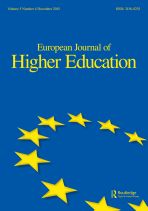
European Journal of Higher Education.
Marek Kwiek. Structural Changes in the Polish Higher Education System (1990-2010): a Synthetic View. European Journal of Higher Education. Vol. 4. No. 3. 2014. 266-280. Here.
Abstract: The paper locates the past two decades of changes in Polish universities in a comparative European context. It shows a wider transition: from an expanding, privatized and disciplinarily divided university of the 1990s to a publicly funded, increasingly contracting and stratified university of the 2000s (and beyond). The gradual political and economic integration of Poland with the European Union has been accompanied by the gradual integration of the Polish higher education system with Western European systems. The paper argues that the major emergent parameter of higher education policy is demographics and that the remonopolization of the system by the tax-based public sector and the gradual decline of the private sector are transforming the system beyond recognition. Processes of ‘de-privatization’ or ‘republicization’ are gradually replacing recent processes of ‘privatization’. Powerful systemic changes in university governance and funding modes are bound to shatter the relative stability of the academic profession. After two decades of being fundamentally different due to the communist legacy (i.e. being ‘post-communist’), selected Polish universities, owing to accelerating processes of academic stratification linked to the 2009–2012 wave of reforms, have a chance to become fully blown elements of a European knowledge production landscape, with increasingly similar governance and funding regimes and the similarly research-involved academic profession.

The Bologna Process in Central and Eastern Europe.
Marek Kwiek. Social Perceptions versus Economic Returns of the Higher Education: The Bologna Process in Poland. In: Tamás Kozma, Magdolna Rébay, Andrea Óhidy, and Éva Szolár (eds.), The Bologna Process in Central and Eastern Europe. Dordrecht: Springer. 147-182. Here.
Abstract: In the present study, the Bologna process is viewed through the lenses of the end product of reform initiatives it has been promoting in the last decade: in this case, a coherent system of three degrees – the bachelor, the master, and the doctorate. And in particular, it is focused on the changing social perceptions and labor market perceptions of the bachelor degree. The increasing acceptance of the bachelor degree in the Polish labor market seems to be an indirect product of the Bologna process: in the 1990s the bachelor degree both had low social prestige and was refused as appropriate higher education credentials by the labor market. But recent national data tend to suggest that while the social prestige of the bachelor degree is still low, its market value is quite high. Consequently, the bachelor degree may have much higher acceptance among students and graduates in the near future. The role of the Bologna process in this transformation has been substantial. There seems to be a combination of national and international forces at work which has managed to transform the national labor market position of the bachelor degree. The study is divided into the following sections: introduction; the degree structure in Poland in an European comparative context; the bachelor degree in Poland from a historical comparative perspective: legal changes and institutional transformations; the degree structure and the labor market response: review of recent empirical evidence; the bachelor degree and private higher education; and conclusions.
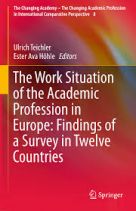
The Work Situation of the Academic Profession in Europe: Findings of a Survey in Twelve European Countries.
Marek Kwiek, Dominik Antonowicz. Academic Work, Working Conditions and Job Satisfaction. In: Ulrich Teichler and Ester Ava Höhle (eds.), The Work Situation of the Academic Profession in Europe: Findings of a Survey in Twelve European Countries. Dordrecht: Springer, 2013. 37-54. Here.
Abstract: In this analysis of changing academic work, working conditions and job satisfaction in Europe, we will present the academics’ assessment of facilities, resources, and personnel. Subsequently, an overview will be provided about the academic workloads and allocation of time between the four major types of academic activities: teaching, research, service, and administration. A further section will discuss job satisfaction and, related to it, the academics’ income. The chapter provides a general picture of the variety of views and activities in 11 European countries, where differences between junior and senior academic staff as well as between academics at universities and at other higher education institutions will be presented, whenever relevant. As will be shown below, the facilities and resources are predominantly assessed positively by European academics, with the least positive scores for research funding. Thereby the ratings of those active at universities are more positive than those active at other higher education institutions, and we note substantial differences as well in the assessments of junior and senior academics. Assessments are by and large most positive in five countries: Finland, Norway, Switzerland, the UK and the Netherlands. Self-declared hours spent on academic work vary as well between European countries, between junior and senior academics, and between academics at universities and other higher education institutions. The longest hours spent at work in higher education institutions (when classes are in session) are reported on average of all academics in Ireland, Italy and Poland and the shortest in the Netherlands, Norway, and Portugal. The weekly mean time ranges from 27 hours per week (junior staff in Norway) to 52 hours per week (senior staff in Germany). Senior staff works longer hours than junior staff in all countries analysed.
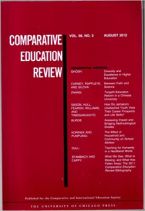
Comparative Education Review.
Marek Kwiek. From System Expansion to System Contraction. Access to Higher Education in Poland. Comparative Education Review. Vol. 57. No. 3. 553-576. Here.
Abstract: The last decade has marked European higher education with particular dynamics. Today, after a decade of «connected» policy, national systems look much more convergent but new questions and dilemmas are emerging: about the nature and quality of higher education, about the real impact of recent reforms in different countries, and about higher education’s future. The book examines the impact of Europe-wide and global developments on national higher education systems. The authors try in particular to place upfront issues of convergence and diversity, of equity and of the relationship between centres and peripheries in higher education. The book is an outcome of research collaboration between six institutes which developed a EuroHESC research proposal on the consequences of expanded and differentiated higher education systems.
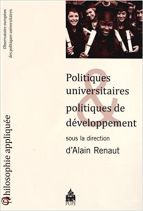
Observatoire européen des politiques universitaires. Politiques universitaires et politiques de développement.
Marek Kwiek. Les universités en contexte de mutations économiques et sociales. Une dépendance sans précédent? In: Alain Renaut (ed.), Observatoire européen des politiques universitaires. Politiques universitaires et politiques de développement. Paris: Presses de l’université Paris-Sorbonne (PUPS). 39-58. Here.
Abstract:Le présent papier est composé de deux parties principales. La première partie décrit les transformations des contextes socio-économiques plus larges, dans lesquels s’inscrivent les universités européennes. Il s’agit en particulier des processus d’européanisation et de mondialisation. Ces transformations conduisent à des réformes, en cours ou envisagées pour l’avenir, des régimes d’État-providence et du secteur public en Europe 1. La seconde partie porte sur les transformations actuelles et futures des universités en tant qu’institutions fortement dépendantes des transformations profondes affectant les économies de la connaissance. Cet article établit un lien fort entre les évolutions à grande échelle et celles qui s’opèrent à petite échelle (en l’occurrence, dans le champ académique). L’établissement d’un tel lien consiste à avancer l’hypothèse que les universités, conçues comme des entreprises fonctionnant à grande échelle, exigent en permanence d’énormes investissements publics et privés, et qu’elles ne sont pas des ilots protégés des secousses de leur environnement social et économique. Ces secousses ont été désignées de diverses manières au cours des deux dernières décennies. On évoqua notamment l’ère de la mondialisation, l’économie de la connaissance, la société post-nationale, la seconde modernité, les États-providence de type post-industriel. Il importe en tout cas de souligner que ces secousses ont conféré aux universités une importance sociale sans précédent dont elles ne pouvaient pas même rêver au cours des décennies précédentes. Intégrées à un cadre socio-économique en évolution, les universités semblent se voir offrir aujourd’hui de nouvelles chances, mais non sans que ces chances soient aussi accompagnées de coûts : elles doivent se débarrasser d’au moins une partie de leurs modes de fonctionnement traditionnel dans la gestion de leurs affaires courantes. Il se pourrait aussi qu’à la faveur de ces chances nouvelles, elles doivent faire face à des changements fondamentaux quant à la perception que la profession académique a d’elle-même et quant à celle qu’en a la société.
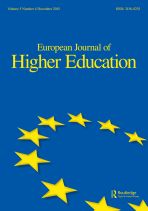
European Journal of Higher Education.
Marek Kwiek. Marek Kwiek. The Growing Complexity of the Academic Enterprise in Europe: A Panoramic View. European Journal of Higher Education. Vol. 2. Issue 2-3. 112-131. Here.
Abstract: Factors generating change in European higher education have been multilayered, interrelated and often common throughout the continent. The article, drawing from current research and policy debates, discusses the three issues: marketization, privatization, and the competition for public funding; conflicting demands and the teaching/research divide in European universities; and European academics and their transforming institutions. The article concludes that emergent complexities, directly or indirectly, refer to the academic profession. Both academics and academic institutions are highly adaptable to external circumstances and change has always been the defining feature of national higher education systems. But the changes envisaged by policymakers, at both national and especially supranational levels, are structural, fundamental and go to the very heart of the academic enterprise.
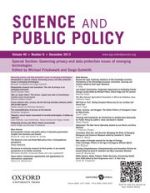
The Bologna Process in Central and Eastern Europe.
Marek Kwiek. Changing Higher Education Policies: From the Deistitutionalization to the Reinstitutionalization of the Research Mission in Polish Universities. Science and Public Policy. Vol. 39. Issue 5. 641-654. doi: 10.1093/scipol/scs042. Here.
Abstract: This paper analyzes changing higher education policies in Poland in the last two decades. It argues that top Polish public universities became divided, with different individual academic and institutional trajectories in the academic fields in which educational expansion occurred (social sciences) and in fields in which it was much less pronounced (natural sciences). Using the concepts drawn from new institutionalism in organizational studies, this paper views the 1990s as the period of the deinstitutionalization of traditional academic rules and norms in public universities, with growing uncertainty about the core of the academic identity. In the expansion era (1990–2005), prestigious public research universities became excessively teaching-oriented. In the period of educational contraction, their currently teaching-oriented segments are expected to become research-intensive. New legislation grounded in an instrumental view of higher education is interpreted as a return to a traditional academic normative consensus, with increased emphasis on, and funding for, the research mission.
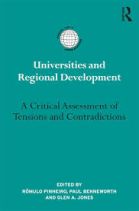
Universities and Regional Development. A Critical Assessement of Tensions and Contradictions.
Marek Kwiek. Universities, Regional Development and Economic Competitiveness: the Polish Case. In: Romulo Pinheiro, Paul Benneworth and Glen Jones (eds.), Universities and Regional Development. A Critical Assessement of Tensions and Contradictions. New York: Routledge. 69-85. Here.
Abstract: This paper explores the regional engagement of Polish universities and shows that the assumptions about the linkages between universities, their regions and economic competitiveness that are taken for granted in the knowledgeeconomy policy discourse in advanced Western European economies may not fit Poland today. Universities in Poland contribute to economic development,but numerous other features that are known to contribute to economic growth are non-existent and numerous inhibitors of economic growth, already addressed in knowledge-intensive economies, are still in operation. Two decades of social and economic transformation (often referred to as “catching up with the West,” or “post-communist transition” and “EU accession” periods) are not long enough to bridge the gap between the two parts of Europe, and convergence processes between Poland and Western European economies may last much longer than was initially assumed following the collapse of communism in 1989.
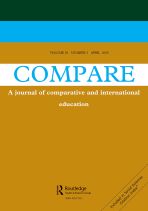
Compare: A Journal of Comparative and International Education.
Marek Kwiek. Public-Private Intersectoral Competition: Fees and Declining Demographics. Compare: A Journal of Comparative and International Education. Vol 42. Issue 1 (2012). 153-157. Here.
Abstract: Polish higher education is one of the most heavily marketised systems in Europe, due to its extraordinarily high share of fee-paying students and the highest share of enrolments (and student numbers) in a private sector in Europe (0.58 million students out of 1.82 million in 2010). Expected demographics may fundamentally change the educational setting in the country, though: it may lead to the re-monopolisation of the system by the public sector, which was unthinkable a decade ago.The expansion of the private sector after almost two decades of its existence seems to be over, after two successive years of decline (by 10% each year) and more expected soon. Consequently, it is desperately looking for survival strategies in the face of declining student numbers in the next 10 years.

Higher Education and the Market.
Marek Kwiek. Creeping Marketization: Where Polish Public and Private Higher Education Sectors Meet. In: Roger Brown (ed.), Higher Education and the Market. New York: Routledge. 2011. 135-145. Here.
Abstract: This chapter discusses changes in Polish higher education related to marketization. The wider context is the transition from a command-driven, communist economy to a market-driven, op en economy and from a communist authoritarian bureaucracy to a parliamentary democracy. The chapter discusses funding mechanisms with respect to institutions, teaching and research; distinct processes marking the turn toward marketization—increasing financial self -reliance of academic institutions and external privatization (growth in the number of private sector providers) and internal privatization (finance-driven cost-recovery mechanisms in public sector institutions). Finally, the chapter discusses market forces in the context of Polish educational policies and offers some concluding remarks.

Universities in the Knowledge Economy: Higher Education Organisation and Global Change.
Marek Kwiek. Universities and Knowledge Production in Central Europe. In: Paul Temple (ed.), Universities in the Knowledge Economy: Higher Education Organisation and Global Change. New York: Routledge. 2011. 176-195. Here. An expanded version published in European Educational Research Journal, Volume 11, Number 1, 2012, pp. 111-126: here.
Abstract: The article discusses an East/West divide in Europe in university knowledge production. It argues that the communist and post-communist legacies in the four major Central European economies studied (Poland, Hungary, the Czech Republic and the Slovak Republic) matter substantially for educational and research systems. The differences in university knowledge production may be bigger than expected, and the role of historical legacies may be more long term than generally assumed in both social sciences and public policy studies on the region. The gradual convergence of both higher education and research systems in two parts of Europe cannot be taken for granted without thoughtful changes in both university funding (both modes and levels) and governance. The article discusses links between knowledge production, economic competitiveness and regulatory and other environments in which both universities and knowledge-intensive companies operate. The role of factors other than higher education and innovation systems is substantially more important for competitiveness and growth in Central Europe than in affluent Western economies. The international visibility of universities as knowledge production centres is low and the analysis of the geography of knowledge production at the level of regions may indicate that Central Europe is in danger of being effectively cut off from the emergent European Research Area.
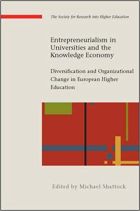
Entrepreneurialism in Universities and the Knowledge Economy.
Marek Kwiek. Entrepreneurialism and Private Higher Education in Europe. In: Michael Shattock (ed.), Entrepreneurialism in Universities and the Knowledge Economy. Maidenhead: Open University Press, 2009. pp. 100-120. Here.
Abstract: It is difficult to analyse private universities in Europe (including those that are part of the EUEREK case studies) in the context of entrepreneurialism in the form the concept has emerged in the basic literature on the subject and available case studies. The private sector in higher education in Europe, with several exceptions (e.g. Portugal and Spain) — from the point of view of both numbers of institutions, share of enrolments in the sector, and study areas offered — has been an educational phenomenon of the transition countries. In some countries (e.g. Sweden, Belgium, and the Netherlands), nominally private institutions are funded in practice with public money, in various forms and under different umbrellas.This chapter is based, in more theoretical terms, on the conceptual work on 'entrepreneurial’, 'enterprising’, and 'proactive’ universities by Clark 'self-reliant’ and 'enterprising’ — as well as; more generally, 'successful’ — universities by Shattock and Williams, and Sporn’s notion of 'adaptive’ universities. In empirical terms, it is based on case studies of entrepreneurialism in universities drawn from the EUEREK study on entrepreneurialism in private institutions within the context of what Clark, Shattock, Williams, and Sporn suggest for the study of public institutions.

Re-Reading Education Policies: Studying the Policy Agenda for the 21st Century.
Marek Kwiek. Globalisation: Re-Reading Its Impact on the Nation-State, the University, and Educational Policies in Europe. In: Maarten Simons, Michael Peters, and Marl Olssen (eds.), Re-Reading Education Policies: Studying the Policy Agenda for the 21st Century. Rotterdam/Boston/Taipei: Sense Publishers, 2009. pp. 195-215. Here.
Abstract: The paper re-reads the complex and changing relationships between the university and the nation-state, and between national and supranational (EU-level) educational policies in Europe. It is focusing on long-term consequences of globalisation -related presures on Europeanation-states with respecto national educational policies. It assesses the indirect impact of globalisation on European universities (via reformulating the role of the nation-state in the global economy), and a direct impact of Europeanisation — as a regional response to globalisation — on universities (via new EU-level discourse on the changing role of universities in knowledge economy). New educational policies promoted at the EU-level are viewed as delinking the nation-states and public universities. The paper re-reads the changing institution of the nation-state and its changing educational policies in the context of globalisation (sections 2 and 3) and in the specific, regional context of Europeanisation (section 4). It follows from presenting three major positions taken in the literature with respect to transformations of the nation-state under globalisation to presenting the process of de-linking traditional universities and the nation-state and its practical dimension at the EU level at which the role of universities is viewed from the perspective of larger social and economic agenda (called the Lisbon strategy for growth and jobs). The major lesson to be drawn from this re-reading exercise is that there are complex and often contradictory relationships between globalisation as a process affecting the nation-states, changing national educational policies, and national and EU-level policies — which all transform the future role(s) of European universities. In sum, current challenges European universities face, and current policy solutions European governments suggest, are best viewed in the overall context of globalisation. National governments are responding to both globalisation and Europeanisation: policies and strategies they produce, instruments they use, and contradictions they cope with are best reread in this context.

The European Higher Education Area: Perspectives on a Moving Target.
Marek Kwiek. The Changing Attractiveness of European Higher Education: Current Developments, Future Challenges, and Major Policy Implications. In: Barbara Kehm, Jeroen Huisman and Bjorn Stensaker (eds.), The European Higher Education Area: Perspectives on a Moving Target. Rotterdam/Boston/Taipei: Sense Publishers, 2009. pp. 107-124. Here.
Abstract: This article focuses on the different senses of the attractiveness of European systems and institutions for students, academics, the labour market and the economy, drawing attention to emergent tensions between different university stakeholders. Universities not only need to be attractive to increasingly differentiated student populations, but they also need to be attractive workplaces and provide attractive career opportunities for academics. Both public and private institutions are under multifaceted pressures to change today. At a time of imminent reformulation of current welfare state systems in most parts of Europe, attractive systems will be able to balance the negative financial impact of the gradual restructuring of the most generous types of welfare state regimes in Europe on public funding for higher education. Ironically, the more successful public entrepreneurial universities are today, the greater the chances are of them following this entrepreneurial direction in the future. The promotion across Europe of a more substantial inflow of both private research funds and student fees can be expected. The possible redefinition of higher education from a public good to a private good is a tendency which may further undermine the idea of heavy public subsidization of higher education, as the economic rationale for higher education is changing. The expected developments may fundamentally alter relationships between university stakeholders, with the decreasing role of the state (especially in funding) and the increasing role of students and the labour market. The expected differentiation-related developments may alter the academic profession in general, and have a strong impact on the traditional relationships between teaching and research in European universities.

Financing Access and Equity in Higher Education.
Marek Kwiek. The Two Decades of Privatization in Polish Higher Education. Cost-Sharing, Equity, and Access. In: Jane Knight (ed.), Financing Access and Equity in Higher Education. Rotterdam/Boston/Taipei: Sense Publishers. 2009. pp. 149-168. Here.
Abstract: The general theme of coping with financial austerity has been prominent in thinking about the future of public higher education over the last two decades. Such thinking is often accompanied by a related theme in the future of public services generally—that of privatization. The generally tight fiscal environment for public services, including higher education, has not relaxed and, in many countries, will predictably intensify into a „pervasive condition of austerity” (Johnstone) or an environment of „permanent austerity” (Pierson). In European transition countries (including in new European Union member states), the solutions suggested for higher education systems increasingly include references to such notions as academic entrepreneurialism in teaching, research, and third mission activities, the need for academic institutions to become financially self-reliant, and cost-sharing in the form or introducing or increasing tuition fees accompanied by more student loans but fewer student scholarships, etc. Other commonly proposed strategies include heavier workloads for academics, larger class sizes, and contracts for faculty instead of tenure.

Policy Futures in Education.
Marek Kwiek. Academic Entrepreneurship vs. Changing Governance and Institutional Management Structures at European Universities. Policy Futures in Education. Vol. 6. No. 6. pp. 757-770. Here.
Abstract: This article discusses academic entrepreneurship in the context of ongoing changes in university management and governance in European universities. The comparative perspective is provided by the European Union (EU) research project 'European Universities for Entrepreneurship: Their Role in the Europe of Knowledge’ (EUEREK) comprising seven European countries, and it draws heavily from ideas and research results of Burton Clark, Michael Shattock and Gareth Williams. It views transformations in university governance and management in the context of the recent emphasis by the European Commission (EC) on the vital role of changes in institutional governance and its 'modernisation agenda for universities’. The article presents a general discussion of the EC’s prioritisation of areas of transformation of European universities in which governance structures figure prominently, discusses the role of risk-taking at entrepreneurial institutions and shows the role of risk management. It also discusses the clash of old academic and new managerial values at entrepreneurial universities and the traditional academic idea of collegiality. Finally, conclusions are drawn regarding the future of public institutions in Europe.
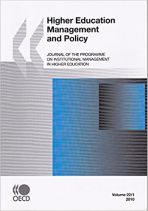
Higher Education Management and Policy.
Marek Kwiek. Accessibility and Equity, Market Forces and Entrepreneurship: Developments in Higher Education in Central and Eastern Europe. Higher Education Management and Policy. Vol. 20. No. 1. 2008. pp. 89-110. Here.
Abstract: This paper explores four interrelated issues: access and equity, the role and the legitimacy of the emergent, market-driven private sector in higher education, the relationships between reforming public services in general and changing public and private higher education, and entrepreneurialism of the emergent private sector in higher education. The four issues are closely related in those transition countries in which the market orientation of public institutions is strong, and in which new private institutions have considerable share in student enrolments.
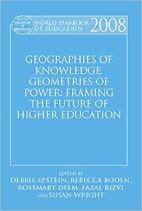
Geographies of Knowledge, Geometries of Power: Framing the Future of Higher Education.
Marek Kwiek. The University and the Welfare State in Transition: Changing Public Services in a Wider Context. In: Debbie Epstein et al.World Yearbook of Education 2008. Geographies of Knowledge, Geometries of Power: Framing the Future of Higher Education. New York: Routledge. 2007. pp. 32-50. Here.
Abstract: This chapter relates current transformations in higher education in European economies to current transformations of the public sector in general, and changes in higher education to changes in other public services provided within traditional European welfare states. In particular, it links ongoing discussions about the future of the welfare state under the pressures of globalisation and changing demographics to discussions about the future of public investment in higher education and to the wider question of the production and reproduction of the university. It discusses the position that the World Bank is taking with respect to the state, public sector reforms and higher education reforms, both in general and for transition economies, and highlights the contrast between its publications on the future of the welfare state and the future of public higher education. The World Bank has been particularly involved in both the conceptualisation and implementation of reforms of major public services, especially but not only in developing and transition countries: the reforms of education, healthcare, and pensions. Further, the chapter discusses the state’s changing fiscal conditions and major competitors to higher education among welfare (and other) services, especially in the European transition countries. It links the question of the reformulation of the pact between the nation-state and the modern university to the issue of the renegotiation of the post-war welfare contract in general. The chapter finds it useful to view higher education in the context of changing welfare state policies as higher education is a significant part of the public sector and welfare state services, in general, have been under severe pressures, both on the theoretical and practical levels. Finally, tentative conclusions are given.

Private Higher Education in Post-Communist Europe. In Search of Legitimacy.
Marek Kwiek. The European Integration of Higher Education and the Role of Private Higher Education. In: Daniel C. Levy and Snejana Slantcheva (eds.), Private Higher Education in Post-Communist Europe. In Search of Legitimacy. New York: Palgrave/Macmillan. 2007. pp. 119-132. Here.
Abstract: The Bologna process—a major European integrating initiative in higher education started by the Bologna Declaration in 1999 and to be completed by 2010—seems to disregard one of the most significant recent developments in several major post-communist transition countries in Central and Eastern Europe: the rise and rapid growth of the private sectors in higher education and, more generally, the emergence of powerful market forces in higher education. Consequently, the ideas behind the Bologna process, the analytical tools, and policy recommendations it provides may have unanticipated effects on higher education systems in certain Central and Eastern European countries. The growth of both the private sector in European (and especially Central and East European) higher education systems and the emergence of powerful market forces in the educational and research landscape in Europe warrant further consideration by the Bologna process if it is not to turn into a merely „theoretical,” myopic exercise. The downplaying of the role of market forces in higher education and research and development in the Bologna documents and the omission of the private sector (with its evident successes in some places and failures in other places) from the overall conceptual scheme of the Bologna process give potentially misguided signals to educational authorities in transition economies. Consequently, the Bologna process might thwart the development of the private sector in countries where chances for the expansion of the educational system otherwise than through privatization have been limited.

The Doctorate Worldwide.
Marek Kwiek, Piotr W. Juchacz. Doctoral Education in Poland. In: S. Powell and H. Green (eds.), The Doctorate Worldwide. Maidenhead and New York: Open University Press. McGraw Hill. 2007. pp. 77-97. Here.
Abstract: Poland has a long tradition in doctoral education, dating back to the 15 Century when such degrees were awarded at Jagiellonian University in Cracow. At present doctoral education takes place in both public and private universities, with over 33,000 students studying. There is a continuing academic tradition, emanating originally from Germany, of having two scientific degrees: the Doctorate and the ‘Habilitation’. The future of this tradition however is subject to debate in the context of pressures for European harmonization specifically the Bologna process. Indeed, Poland like so many other countries in Europe and beyond faces significant transformation in the coming years as pressures to redfine the doctorate and its purposes and outcomes are addressed.


